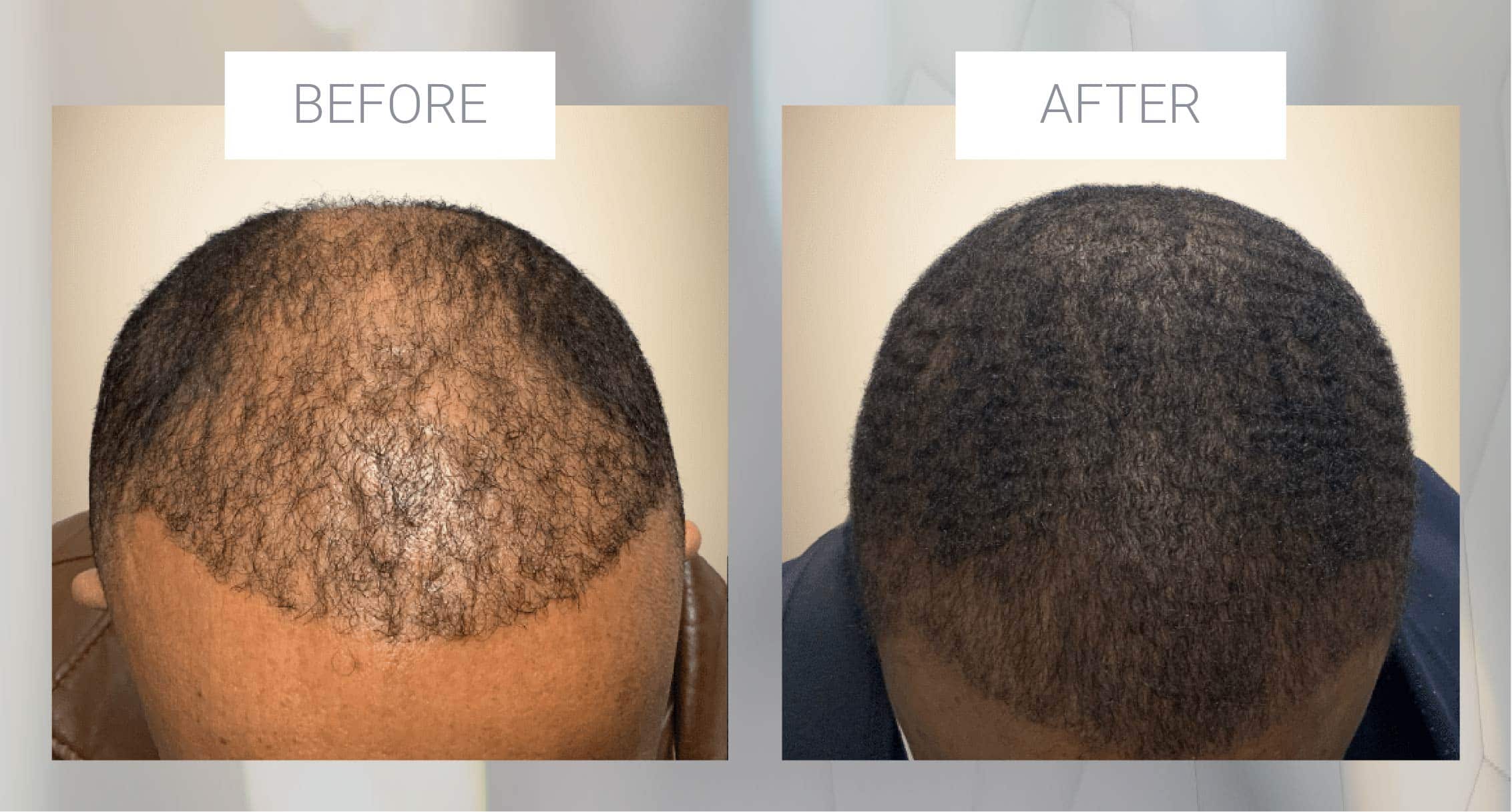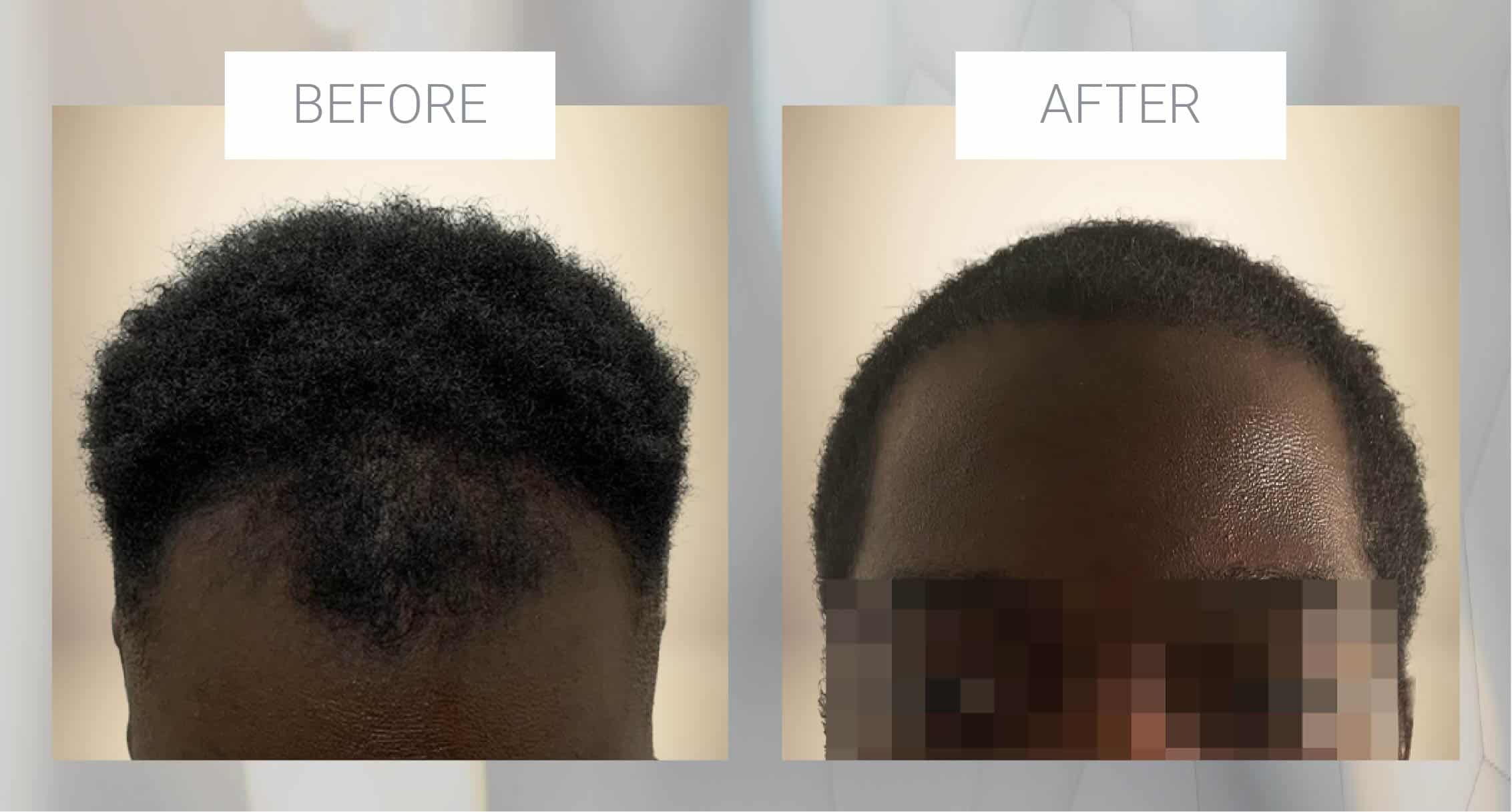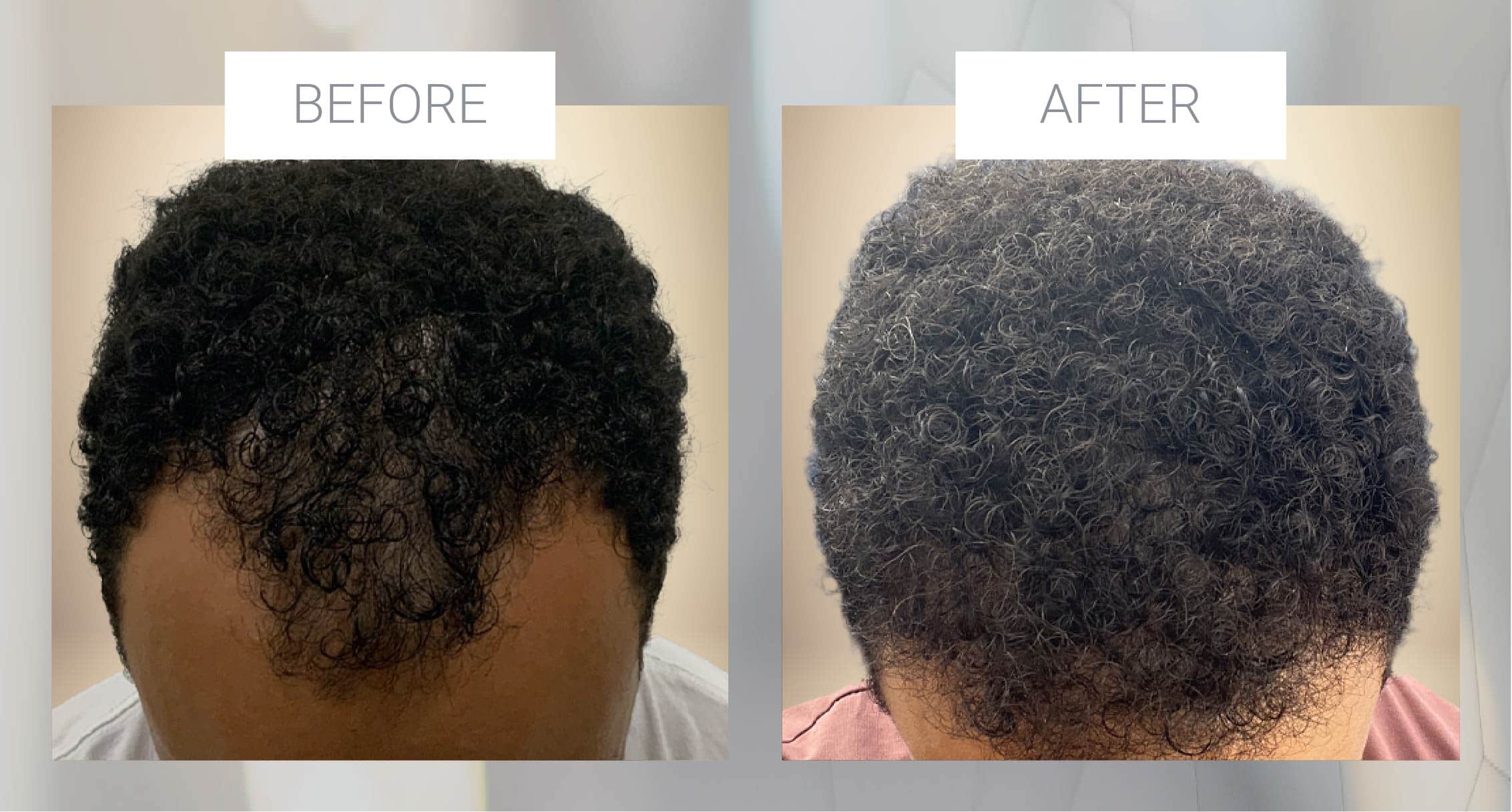You may have been told that hair transplants for African American men and women can be challenging and procedures like Shave-Less Follicular Unit Excision (Shave-Less FUE) are not an option.
This couldn’t be further from the truth.
Successful results are possible when your hair restoration doctor is familiar with the unique hair texture and hair growth qualities of African Americans.
“I can go on and on about how I’ve been on the search for a great hair restoration specialist that can do a black man’s hair and do it right. I have two other friends who both went in different direction than seeing Dr. Danyo. Huge mistake. One still has scars on the back of his head and the other just looks a mess. If you’re African American looking for someone to do you right, you’ve got to see Dr. Danyo.” – Ronald H.
What is FUE?
Hair transplant surgery, or Follicular Unit Extraction (FUE), takes hair follicles (aka hair grafts) from a donor site where your hair growth is still thick to a recipient site where your hair is thinning or balding.
And the best part of this procedure is that most patients return to work and resume daily activities the day after their hair transplant procedure.
Finding a Doctor That Understand African American Hair
Because African American and Caribbean hair is distinctively different from other ethnicities, it’s important to work with a hair restoration team that is thoroughly familiar with the advantages and challenges African hair presents.
What Makes Black Hair Unique and Are There Any Advantages?
Regardless of a person’s ethnicity, hair type will affect how a hair transplant is performed and the final results. African American hair is distinctive due to its curly, coarse texture and C-shaped follicles that curl both above and beneath the skin.
In addition, African American’s lateral hairline growth pattern, or the natural part in your hairline, is often more pronounced. Understanding this growth pattern is important when performing a hair transplant.
“It’s been a good year and I’m feeling great about my FUE hair transplant. I’m an African American male. I received a hair line transplant at the age of 38 and now my hair looks like it was when I was in my mid twenties.” – Gary H.
For an experienced African American hair restoration Physician, these unique traits make African American individuals excellent candidates for hair transplants with the following advantages:
Fewer Grafts, More Volume – Because the hair is thicker, curvy, and fuller than straight hair, fewer grafts are needed to achieve natural-looking results. African American hair yields more volume with fewer follicles.
Minimal Down Time – Since the Shave-Less FUE procedure is performed without shearing hair down to the scalp, you can return to work and activities much faster without anyone knowing you have begun a journey toward a thicker, fuller head of hair.
Increased Confidence – Thinning or balding hair should never hold you back. While we can’t eliminate this genetic tendency – yet, you do have safe and excellent options for restoring your hair loss. Like any self-maintenance procedure, a hair transplant can boost your appearance so you can concentrate on other things.

What Are the Challenges African Americans Face When Seeking Hair Transplantation?
While fewer grafts may be needed for natural-looking results, harvesting African American’s tightly curled hair follicles requires special techniques and tools to avoid damage to the transplanted hair.
Curvature of Hair Follicles – Tightly curled hair grafts take up more space. This means the donor area around the hair follicles needs to be wider to ensure the coiled hair is removed in one piece without damaging the hair bulb.
Once successfully removed, the curly hair must also be grafted into its new location properly. Damage to these curved hair follicles will stunt new hair growth, and the transplant is less likely to be successful.
Keloid Scarring – African American’s skin has the potential for raised, thickened keloid scarring. A knowledgeable hair restoration physician can take measures to minimize scarring.
Without question, it’s important to choose a hair restoration doctor who understands the unique challenges African Americans face when approaching hair transplantation.
An experienced doctor and superb medical support team are essential to creating a natural-looking hairline with minimum down-time.
What Causes Hair Loss in African Americans?
Hair loss in African Americans can be the result of genetic conditions, specific hairstyles, or as with anyone, may result from stress or hormonal imbalance. An experienced African American hair restoration doctor can help you explore the reasons why your hair may be thinning or balding.
Androgenic Alopecia
Androgenic Alopecia in African Americans, as with other ethnicities, is a genetic condition that causes gradual, pattern baldness after puberty due to an inherited sensitivity to male hormones.
This form of hair loss can occur in both men and women leading to inflammation and fibrosis of the hair follicles, resulting in weakened and thinner hair.
In men, hair typically begins receding at the front hairline or crown of the scalp, or a combination of the two. Women may retain their front hairline but experience overall hair thinning.
Traction Alopecia
Traction Alopecia creates hair loss in African Americans due to damage to hair follicles from repeated tension or pulling. Over time, prolonged inflammation and repeated hair tension from hairstyles that pull the hair back (e.g. braids, weaves, cornrows, tight ponytails, and heavy locks) tug and loosen the hair follicles. Tight hairstyles applied to relaxed hair can lead to even further damage.
Symptoms of traction alopecia include small flesh-colored or white bumps around the hair follicles pulled most tightly, redness and tenderness. Baby (vellus) hairs, not caught up in the hairstyle, and broken hairs may be noticeable around the hairline.
“In our society, our hair from the style, color, texture, condition is constantly being assessed. I would say this is even more true in the Black community. Dr. Danyo and his team have restored my desire to express myself through my natural hair and I am excited about my renewed confidence.” – Cynthia C.
Central Centrifugal Cicatricial Alopecia
This form of alopecia is characterized by permanent hair loss in the center or crown of the scalp, inflammation, and scarring. It happens almost exclusively in African American women aged 30 to 55 years of age.
Central Centrifugal Cicatricial Alopecia is a unique form of hair loss that tends to run in families. Some research suggests it may be caused by infection, autoimmune disease, or genetic factors.
Treatment includes topical and systemic corticosteroids and oral tetracyclines with results varying widely. When these do not work, hair transplantation can be effective.
Alopecia Areata
One of the more common forms of hair loss, alopecia areata, affects people of all races, skin tones and genders.
It’s called alopecia areata because the disease causes unpredictable, small quarter-sized patchy “areata” areas of hair loss.
These patchy hair loss areas are caused when the immune system attacks hair follicles. People with autoimmune diseases like psoriasis, thyroid disease, or vitiligo and those with allergies may be more likely to suffer from alopecia areata. For some, this form of alopecia may result from emotional stress or illness.
Some people develop patchy areas of hair loss, regrow it and never have another episode. More often, people lose their hair, see it regrow and fall out again.

African American Hair Transplant Options
Textured, curly hair tends to be more fragile than other types of hair, and the roots are more easily damaged. Effectively removing and placing curly hair follicles without damaging them can be performed using the latest hair restoration procedures and techniques.
Follicular Unit Extraction (FUE)
Follicular Unit Excision (FUE), and specifically, No-Shave/Shave-Less FUE is the most discreet surgical hair transplant procedure available.
Unlike conventional FUE procedures, you don’t have to shave your head prior to the transplant, which is why Shave-Less FUE is preferred over Follicular Unit Transplantation (FUT) which requires a doctor to cut a strip of skin from the back or side of your head and extract individual hair follicles for insertion into the balding parts of your scalp.
The Shave-Less FUE technique results in less down-time, less risk of infection and post-operative complications. Our patients do not suddenly show up back at work with a shaved head or end up with linear scars in the back of their heads.
In most cases, your donor site is concealed, and you don’t need a strange haircut. As your transplanted follicles begin new growth, your fullest natural hair is restored.
What is Most Important for African Americans to Know When Considering Hair Restoration?
As anyone with curls can attest, it’s not easy to find professionals who have experience working with curly hair.
Dr. Danyo and the medical team at North Atlanta Hair Restoration can safely and effectively remove and place African American curly hair follicles without damaging them for completely natural results. This is particularly important when working with Black individuals’ curly hair follicles.
Replacing the curved follicle is also critical. Dr. Danyo and his trained medical team place carefully and creatively places each follicle based on its texture and growth pattern to seamlessly blend with your existing hair.
The number of grafts needed is also an important decision for African Americans to make with their doctor’s guidance. While overall, African Americans have reduced hair follicle density, the texture and curvature of the hair follicles cover more of the donor site resulting in the need for fewer grafts.

Ready to Take the Next Step?
Where other clinics find the challenge of coarse and curly hair overwhelming, Dr. Danyo and his team at North Atlanta Hair Restoration have perfected techniques that result in fuller, thicker hair, often with fewer grafts for African Americans.
That’s why we are one of the only worldwide that offers and successfully completes No-Shave/Shave-Less FUE procedures for African American men and women.
Schedule a personalized consultation with Dr. Danyo to find out which hair restoration treatments might be right for you.

